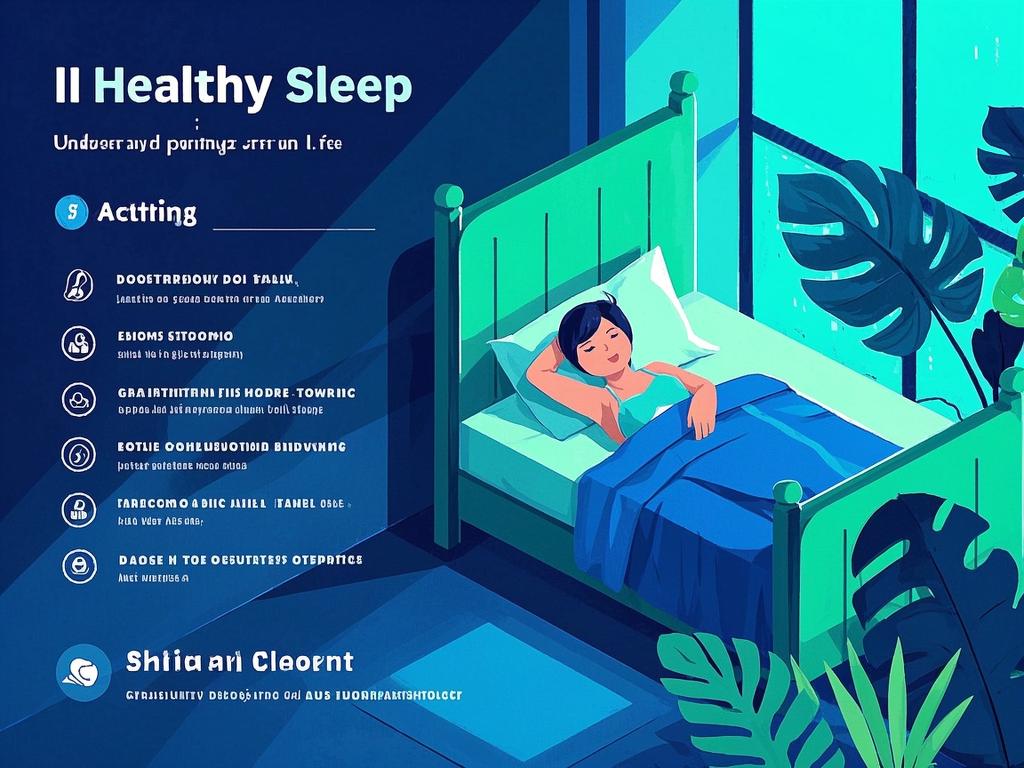
Healthy Sleep: The Underrated Pillar of a Thriving Life
In the grand tapestry of a thriving life, one crucial thread often goes unnoticed and underappreciated: healthy sleep. We live in a world that glorifies constant activity, productivity, and hustle culture, leaving little room for the restorative power of a good night's slumber. But let me tell you, dear reader, sleep is not just a passive state of rest; it's an active, dynamic process that plays a pivotal role in our physical, mental, and emotional well-being.
First and foremost, let's talk about the numbers. Did you know that chronic sleep deprivation is linked to a plethora of health issues? According to recent studies, over 35% of adults in the United States alone report not getting enough sleep on a regular basis. This lack of shut-eye is associated with an increased risk of obesity, diabetes, cardiovascular diseases, and even certain types of cancer. It's as if our bodies are crying out for a proper recharge, but we're too busy burning the midnight oil or scrolling through our phones instead.
Now, let's delve into the fascinating world of sleep physiology. During sleep, our bodies go through a series of intricate processes that are essential for our overall health. One of the most important functions of sleep is the restoration and repair of tissues. While we sleep, our cells work overtime to repair damaged DNA, replenish energy stores, and eliminate toxins from our bodies. It's like a biological factory running at full speed, but instead of churning out products, it's fixing all the little things that get worn out during the day.
But sleep isn't just about physical repair; it's also crucial for our mental and cognitive function. Have you ever noticed how a good night's sleep can make you feel more refreshed, focused, and creative? That's because during sleep, our brains consolidate memories, process emotions, and regulate neurotransmitters. Without adequate sleep, our cognitive abilities decline, our mood becomes more volatile, and we're more prone to making mistakes. It's like trying to drive a car with a flat tire; everything just feels a bit off.
So, why is it that we seem to be so neglectful of this essential aspect of our lives? Well, one of the main culprits is our modern lifestyle. With the advent of technology, we're constantly bombarded with stimuli that make it difficult to disconnect and unwind. We're checking our phones, answering emails, and watching TV long after the sun has gone down, disrupting our natural sleep rhythms. It's as if we're in a never-ending race against time, but we're forgetting that sometimes, the best thing we can do is slow down and give our bodies the rest they need.
Another factor contributing to sleep deprivation is stress. In today's fast-paced world, stress is an inevitable part of life. But when we're constantly stressed out, our bodies go into a fight-or-flight mode, making it difficult to fall asleep and stay asleep. We lie in bed, our minds racing with all the things we need to do, and before we know it, hours have passed and we're still wide awake. It's like trying to calm a wild horse; the more we struggle, the more agitated it becomes.
But fear not, dear reader, there is hope. By making some simple changes to our lifestyle, we can improve the quality of our sleep and reap the many benefits it has to offer. First and foremost, establish a regular sleep schedule. Go to bed and wake up at the same time every day, even on weekends. This helps regulate your body's internal clock and makes it easier to fall asleep and wake up naturally. It's like training your body to be a well-oiled machine, following a set routine day in and day out.
Create a sleep-friendly environment. Make sure your bedroom is dark, quiet, and cool. Use comfortable bedding and pillows, and consider investing in a good mattress. Remove all distractions, such as electronic devices, from your bedroom. It's like creating a little oasis of calm where you can escape the chaos of the outside world and let your mind and body relax.
Limit your exposure to caffeine and alcohol, especially in the evening. Both of these substances can interfere with your sleep, making it more difficult to fall asleep and stay asleep. It's like pouring gasoline on a fire; they may give you a temporary boost, but they'll ultimately disrupt your sleep and leave you feeling worse in the morning.
Finally, practice relaxation techniques before bed. Meditation, deep breathing exercises, or reading a book can help calm your mind and prepare your body for sleep. It's like taking a mental vacation, letting go of all the stress and worries of the day and focusing on the present moment.
So, the next time you're tempted to sacrifice sleep for the sake of productivity or entertainment, think again. Remember, healthy sleep is not a luxury; it's a necessity. It's the foundation upon which a thriving life is built. Without it, we're like a ship without a rudder, adrift in a sea of fatigue and confusion. So, prioritize your sleep, give your body the rest it deserves, and watch as your life transforms for the better. Sweet dreams!

